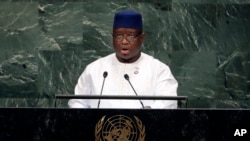Sierra Leone’s President Julius Maada Bio made international headlines when he declared rape and sexual violence a national emergency earlier this year. Voice of America’s Peter Clottey sat down with the president and First Lady Fatima Maada Bio on the sidelines of the U.N. General Assembly recently and asked about their work to elevate the plight of women and girls in the West African nation.
Bio said he sees improving the lives of women as a key way for the country to develop economically and in terms of health indicators.
“I believe that if we have to develop as a nation on the world stage where women are in the majority we must treat them fairly, we must take them seriously and we must make them a part and parcel of sustainable development goals,” he said. “Making sure that they are made to be productive and be part of the march towards sustainable development goals.”
In 2018, the rape of a five-year-old girl in Sierra Leone by her uncle that left her paralyzed generated outrage and calls for stricter laws. That same year instances of reported sexual violence rose to 8,505, an all-time high.
According to the Rainbo Initiative, a Sierra Leonean organization that helps survivors of gender-based violence, 93 percent of victims treated are younger than 17 years of age, and 24 percent are younger than 11.
Historically, most attackers go unpunished. Bio said he is determined to change that.
“We are going to make sure that this fight is taken very seriously,” Bio said. “I must say that I was appalled by the nature of what I met. Women were not taken seriously girls and little babies were being raped with impunity.”
Bio said his administration is now taking “drastic action” against those who commit rape. In September, the country’s legislature amended its Sexual Offenses Act to allow a maximum punishment of life in prison for someone who rapes a child.
The country has also created a Sexual Offenses Division of the High Court in order to hear sexual assault cases and increase rates of prosecution.
First Lady Fatima Bio has spearheaded the “Hands Off Our Girls” campaign which seeks to not only end gender-based violence but address issues including teen pregnancy, child trafficking, child marriage and prostitution.
At an event during the U.N. General Assembly, she was joined by other first ladies from across the continent as well as African Development Bank President Akinwumi Adesina.
“The Hands Off Our Girls campaign is a campaign that I believe should be a global campaign should not be limited just within Sierra Leone,” she told VOA. “And we have worked very hard, to a point where the title itself has a life of its own. It's basically traveling like wildfire around the world.”
During the U.N. event, Fatima Bio shared personal details about her life including the fact that she was forced to flee an arranged marriage with a much older man in her early teens. “From that moment I vowed that I would not see a child being abused,” she said.
The first lady sees the movement spreading. In neighboring Liberia First Lady Clar Weah has launched the “She's You” campaign to elevate women’s rights and fight against gender-based violence.
Now that the conversation about rape has begun in West Africa, Fatima Bio believes it will only continue.
“What we have done as a country is actually introduced the subject of early marriage. Rape is a subject that people don't like to talk about. In Africa people like to use a lid to cover it,” she said. “And we have actually lifted that lid.”






